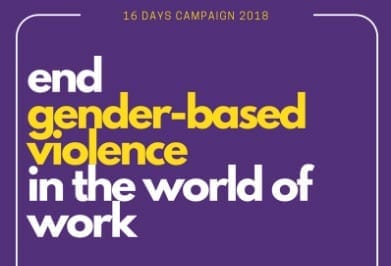
Nov 19, 2018
On November 25, the Solidarity Center joins our allies around the world in launching 16 Days of Activism against Gender-Based Violence. This event highlights the need to end violence against women and girls around the world and pass a global standard to address the full scope of gender-based violence at work.

Solidarity Center Gender Specialist Robin Runge
Solidarity Center’s Senior Gender Specialist Robin Runge discusses gender-based violence at work and how unions and our allies are working for passage of a global standard that would address this prevalent, and generally unacknowledged, workers rights violation.
Q.: What is gender-based violence at work?
Robin Runge: Gender-based violence at work, importantly, is being defined by workers around the world and the International Labor Organization (ILO) through the standard-setting process: It is violence and harassment directed at persons because of their sex or gender. This definition is intentionally broad to recognize that people experience a range of behaviors based on their perceived or actual gender or sexual identity. Gender-based violence at work is inclusive of sexual harassment. A classic example of sexual harassment at work is a supervisor or a manager demanding sex from someone who works for them in exchange for keeping their job or for a promotion. This is also a form of gender-based violence and harassment at work. Similarly, a supervisor harassing or physically abusing a male worker who is perceived to be acting female or to be gay. Gender-based violence at work also includes the impact of domestic violence on the workplace. The majority of workers who experience gender-based violence at work are women because of social and economic inequality, which makes women more vulnerable to these forms of abuse and harassment. However, men also experience gender-based violence and harassment at work.
Q.: Why is gender-based violence and harassment at work a worker rights issue?
RR: Gender-based violence and harassment is one of the most insidious and pervasive worker rights violations. In fact, it is impossible to achieve other worker rights goals such as gender equality, and safe and decent work, if we don’t address gender-based violence. Gender-based violence and harassment at work prevents all workers from being able to assert their rights to freedom of association and speech in the workplace and to take part in collective action about wages and working conditions.
We know that the rates of gender-based violence, although they vary from sector to sector, are extraordinarily high. So for example, we know that in Cambodia, beer promoters, who are mostly women, more than 80 percent of them have been sexually harassed on the job. In many sectors, especially where women are the majority of workers, including the garment sector, and the service industry, the majority of workers report experiencing forms of gender-based violence and harassment. Something that impacts the majority of the workers in a particular sector is a core labor and union issue.
Q.: What’s being done to address gender-based violence and harassment at work?
RR: Workers, including domestic workers, precarious workers, part-time workers, street vendors and the unions that represent them began advocating for a global standard to end gender-based violence in the world of work in 2013. Workers know from their experiences that a global ILO standard applies to all industries and all countries around the world, thereby ensuring that workers throughout the supply chain benefit from the same protections. Over several years of a global campaign, led by the International Trade Union Confederation (ITUC)—and we at the Solidarity Center were a huge part of this effort—workers and unions were successful in having the ILO place a discussion about the need for a standard to end gender-based violence in world of work on their agenda.
In June 2018, at the annual International Labor Conference, the first negotiations took place among workers, governments and employers on a standard to end violence and harassment in the world of work. The second and final set of negotiations will take place in June 2019.
Q.: How have unions led in efforts to end gender-based violence and harassment at work?
RR: Unions really have been the catalyst for change in this area. And the Solidarity Center has played a critical role in helping and supporting unions in leveraging their collective power to achieve this. Gender-based violence is hidden. As individuals who experience this, women are socially and culturally trained not to speak of it. Women are also often afraid that if they speak about it, they will be be retaliated against, including more physical abuse or sexual abuse. Since many people who experience gender-based violence and harassment don’t speak about it, it’s as if it’s not happening. Moreover, workplace structures can create environments that permit and perpetuate these abuses. Workers coming together in unions and other collective worker action provides a mechanism whereby workers can overcome these barriers to preventing and addressing gender-based violence and harassment at work.
Q.: What can unions and their allies do to ensure ratification of the ILO standard?
RR: We’re in the middle of the two-year standard-setting process during which the ILO has provided opportunities for governments, employers and worker rights organizations to submit comments on draft language and participate in negotiations at standard setting meetings in June 2018 and June 2019. The Solidarity Center has supported our union partners, encouraging them to participate in this process and thereby ensuring that the voices of workers are driving the content of the standard. In particular, participation of our partners has led to the development of definitions of violence and harassment, gender-based violence, “world of work,” and worker that are broad and inclusive of all workers’ experiences, including women workers in precarious, part-time and informal work.

Nov 16, 2018
In Colombia, the national union of food workers, SINTRAIMAGRA, is denouncing the murder of one of its union leaders and is asking the government to identify, capture and prosecute those who perpetrated the crime.
Shortly before he died, Edilberto Niño Cristancho told authorities he was stabbed 18 times by two assailants as he boarded a taxi November 4 in Villavicencio.

Colombian palm oil union leader Edilberto Nicon Cristancho was murdered this month, one of more than a dozen union leaders killed this year. Credit: SINTRAIMAGRA
Niño Cristancho was leading an organizing and formalization campaign for palm oil workers in the country’s fertile eastern plains together with the Central Unitaria de Trabajadores (CUT).
Palm oil workers in Colombia and around the world are part of a global supply chain that often exploits human labor to feed the world’s growing demand for household products and cosmetics. Palm oil workers are forced to work long hours in hazardous conditions, without adequate safety equipment and unprotected from contact with chemicals like paraquat, an acutely toxic chemical.
With CUT, Niño Cristancho sought to ensure palm companies in the region fully complied with workers’ constitutional and legal rights, as well as with International Labor Organization conventions, such as the right to form unions and bargain contracts.
For decades, Colombia was the most dangerous country for union leaders and members, with thousands of activists murdered over the past 20 years, and it remains among the five worst countries for worker rights, according to the International Trade Union Confederation (ITUC) 2018 Global Rights Index. Perpetrators of murders and attacks are rarely punished.
Although Colombia’s overall homicide rate dropped after a 2016 peace agreement between the government and the Revolutionary Armed Forces of Colombia (FARC), worker rights activists are now facing a worsening security environment. Between January 1 and August 27, 14 union members were murdered, six were physically attacked and 134 threatened with violence, according to the Escuela Nacional Sindica Information Database of Human Rights.
Social activists, indigenous leaders and environmentalists also are being murdered in greater numbers. Nearly 200 community leaders were killed in 2018.
Unions are concerned that recent statements by the government linking social protests to armed groups encourages violence, and SINTRAIMAGRA is asking the government to provide security guarantees to union members and union leaders.
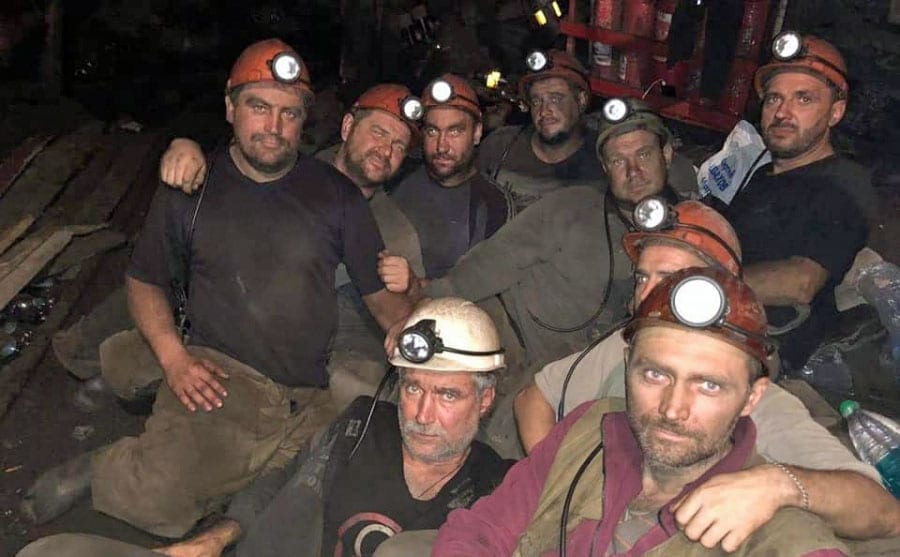
Nov 2, 2018
Coal miners in Ukraine have protested underground over the past 15 days to demand months of unpaid wages after 33 miners at the state-owned Lysychansk coal mines refused to leave from their underground shift. The miners are demanding wages they did not receive from June to September 2018, as well as for several months from 2015 to 2017.

KVPU Chairperson Mykhailo Volynets (second from left) visited with coal miners waging an underground protest. Credit: KVPU
While the Ukraine government promised to transfer some of the $10.6 million owed to these miners, Mykhailo Volynets, chairperson of the Independent Trade Union of Miners of Ukraine (NPGU), said even if this promise is honored, some workers may not be paid. Cleaners and boiler house workers are among those who will not receive any of the funds, although they have also not been paid for four months.
Members of the NPGU held solidarity rallies at several locations in Ukraine’s Lviv and Donetsk mining regions. Across Ukraine, workers at state-owned coal mining enterprises are owed roughly $28.5 million in unpaid wages, and this month the figure will reach $42.6 million as October wage payments are due.
Volynets, a former mine worker, visited the men in the mine this week and said he is “deeply concerned about their health and lives. “These miners show genuine courage and integrity during their struggle for justice and fair payment,” Volynets says.
“The air atmosphere and air humidity in mine are also a point of concern. The miners are in dangerous conditions at a depth of 600 meters (1,968 feet). These people work in such extremely difficult and dangerous conditions, and their wages aren’t high.”
In Ukraine, a skilled miner may be paid as little as $280 to $320 a month. Ukraine has the lowest wages in Europe.
Ukraine miners have received international support with the global union IndustriALL sending miners a solidarity letter and calling on the Ukraine government to immediately pay all wages in arrears.
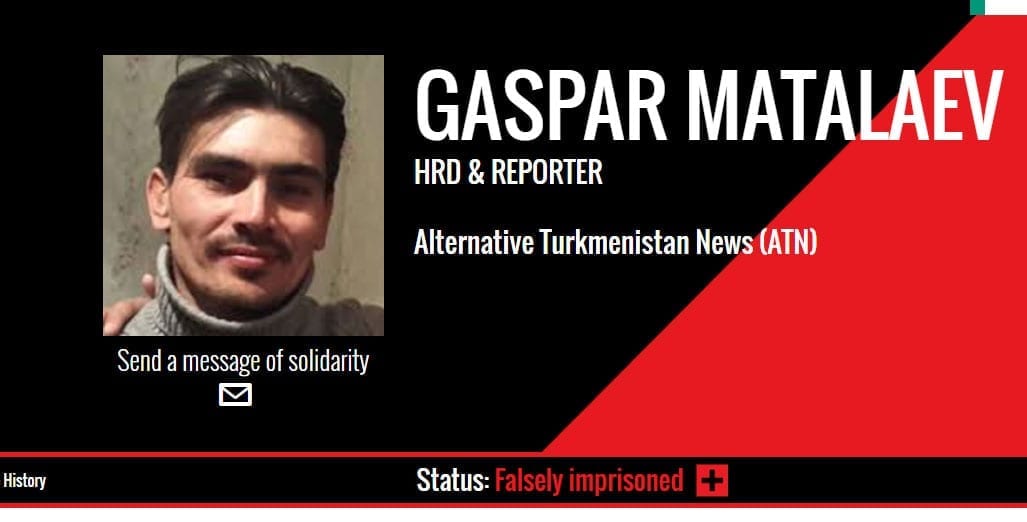
Nov 1, 2018
Two media workers have been murdered each week on average this year—73 to date, making it likely the number of those killed will meet or exceed that of 2017, when 82 media workers were murdered, according to data compiled by the International Federation of Journalists (IFJ).
Yet the culprits are rarely held accountable for these crimes.
“The biggest reason people continue to do it is because they know they can get away with it. As long as impunity is at 90 percent, most people think they’re not going to be held to account for it,” IFJ Deputy General Secretary Jeremy Dear said in an interview with the Solidarity Center. Countries that bill themselves as democracies, such as Brazil and Mexico, are among those where government officials and criminal groups go unpunished for murdering journalists in high numbers.
In 2013, the United Nations designated November 2 as International Day to End Impunity for Crimes against Journalists, yet the impunity rate has remain unchanged, even as attacks are increasing. Last month, representatives of journalists, media workers broadcasters and newspapers around the world took their case to the UN to urge creation of a UN Convention dedicated to the protection of media professionals.
The campaign for the convention emphasizes that holding accountable perpetrators of violence against media workers would not only benefit individual journalists, but society.
“It is not just the individual’s right that is being denied, but it is the collective right of societies to information—and yet at the moment there is no means for a third party to be able to seek redress for attacks against journalists,” says Dear.
Hundreds of journalists also are jailed each year on false charges, according to the Committee to Project Journalists. Among them is Gaspar Matalaev, an Alternative Turkmenistan News reporter. Matalaev was arrested in October 2016, two days after his report on state-orchestrated forced labor of children and adults in Turkmenistan’s cotton harvest. (Sign and share a petition in support of his immediate release.)
The proposed convention also would address arbitrary arrest and detention, include an expedited procedure to address violations of worker rights, and codify journalistic guidelines and criteria into a stronger enforcement mechanism. (To add your organization’s name to support the Convention, sign here.)
Attacks Rise against Women Media Workers
More than half of women in media have suffered work-related abuse, threats or physical attacks in the past year, according to a survey this year by the International Women’s Media Foundation (IWMF) and TrollBusters. An IFJ survey of women media workers earlier this year found similar responses. Nearly two-thirds of respondents to the IWMF survey said they had suffered online harassment or threats, with more than one in 10 reporting it happened often or daily. Of those, approximately 40 percent said they avoided reporting certain stories as a result of online harassment.
Yet “up to three-quarters of media workplaces have no reporting or support mechanism,” broadcast journalist Mindy Ran said at a panel on challenging impunity and gender-based violence against women journalists and media workers in March. Without safe and structured systems for reporting gender-based violence at work, employees are less likely to seek assistance—and, as the IFJ survey found, 66 percent of journalists who had experienced some form of gender-based violence said they had made no formal complaint.
“Often they suffer a double jeopardy—on the grounds of being a journalist, and being attacked for that, and on the grounds of being a woman,” says Dear. Online attacks are especially prevalent, he says, citing cases in which governments have set up websites to assail women’sreputations on the basis of sexual identity or morality and for challenging cultural norms.
“It is an increasing trend in the way of discrediting somebody as a journalist in attacking their integrity and their character with the aim of making them either censor themselves or give up being a journalist.”
Journalists Targeted as Authoritarianism Spreads
Underlying the rising attacks against journalists is the broader global clampdown on human rights in which worker rights are among the most frequently violated.
“You have an increasing number of governments who rely on more authoritarian means to achieve their objectives,” Dear says. Such regimes, once limited to a few countries, now are “all over the world.”
Anti-terrorism laws provide governments new tools for repression.
“This idea of misusing laws that are designed to stop terrorism, designed to stop criminality but in fact are increasingly used against journalists and civil society to prevent any kind of alternative view any kind of dissent in a society.”
As the eyes and ears of their societies, journalists and media workers are instrumental in preserving and advancing freedoms fundamental to human rights.
When journalists are threatened, attacked or imprisoned, says Dear, the effect “is self-censorship, which damages societies, damages democracy, has an impact on citizen’s right to know.”
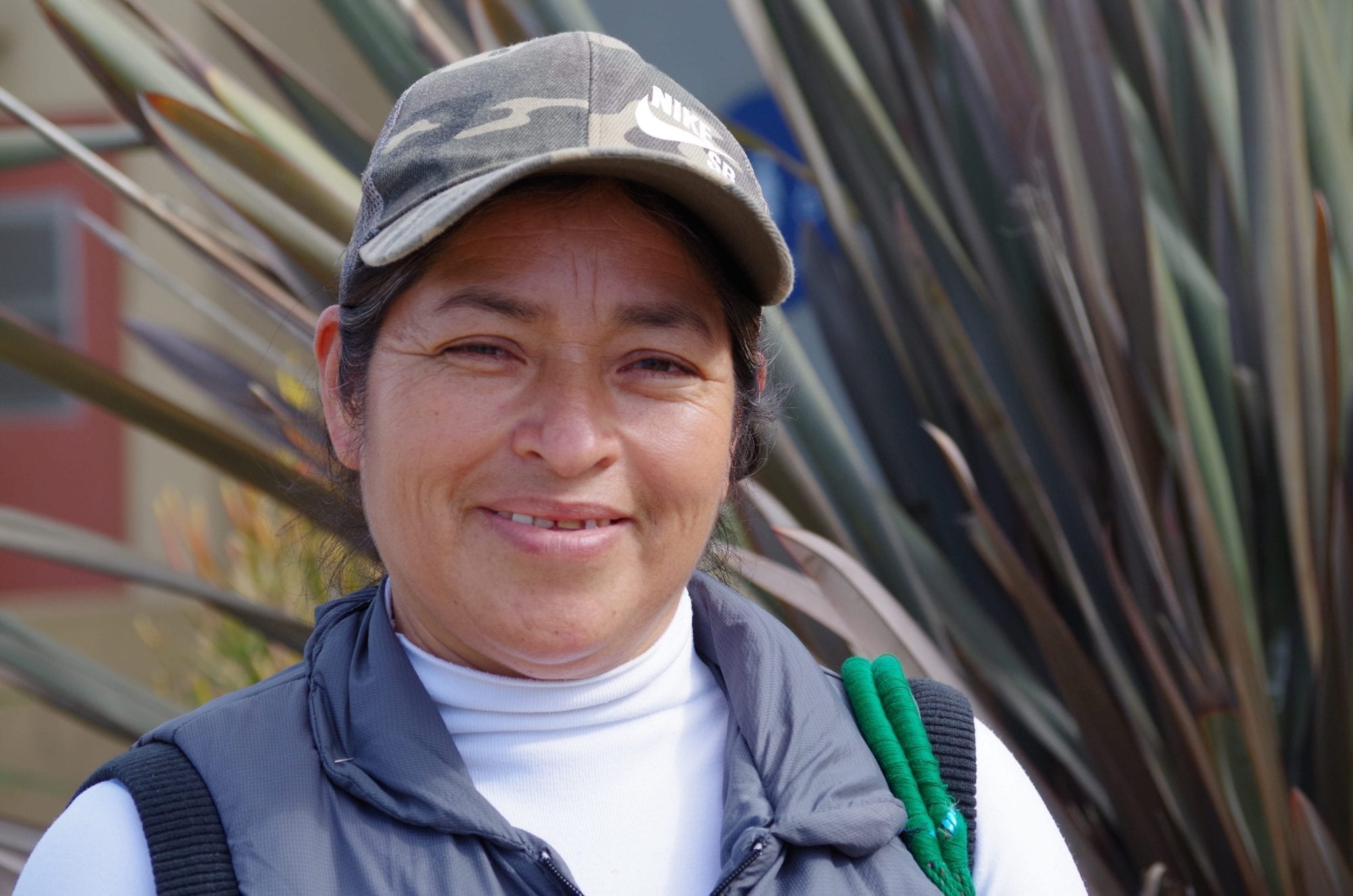
Oct 24, 2018
When thousands of farmworkers from Mexico’s coastal state of Baja California waged a 12-week strike in 2015 to protest poverty wages—roughly $4 a day—and poor working conditions like lack of access to water, Abelina Ramírez saw her chance to ensure women’s concerns, such as sexual harassment in the fields, were addressed.
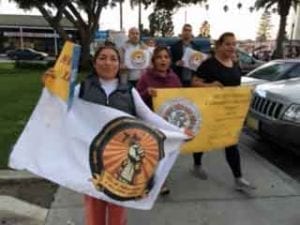
“It’s important for us to get the message out to workers to join the union”—Abelina Ramírez Credit: Solidarity Center/Tula Connell
“I decided to join the national caravan [in 2017] from San Quintín to Mexico City,” says Ramírez. “I joined the coordinating team because neither [of the organizations leading the strike] had a woman leader who could speak to any of these issues, and that’s where I got fully involved,” she says, speaking through a translator. (Ramírez discusses her work here.)
The strike drew international attention to the conditions of the region’s roughly 80,000 workers who pick berries and tomatoes for 160 different agro-industiral companies, and workers ultimately won wage increases, boosting pay from approximately $4 per day to $8-$10.
Ramírez, now alternate secretary of gender equality for the National Independent and Democratic Union of Farmworkers (Sindicato Independiente Nacional Democrático de Jornaleros Agrícolas, SINDJA), was among speakers at the recent Solidarity Center conference in Los Angeles, “Realizing a More Fair Global Food Supply Chain.”
In an interview with the Solidarity Center, Ramírez says workers are still fighting for their original 14 core demands, among which is onsite medical facilities. Workers who are injured or fall ill in the fields must be transported long distances to receive care, and some have died in transit, she says.
Further, despite the wage increase, farmworker pay is still comparable to wages paid in much poorer countries, and farmworkers say a national wage category for them should be created, as exists for carpenters and other professional workers.
“What we’re fighting for is a professional-level salary because we see the work we do—cutting, picking and packing—as part of a professional category, and we’re not being respected,” says Ramírez.
Women Farmworkers Struggle to Care for Their Children
Like many women and men in Mexico’s southern Oaxaca region, Ramirez saw an opportunity to improve her livelihood when a labor recruiter showed up promising good wages for picking berries and tomatoes far north, in San Quintín.
“When there are no options because of poverty, we end up migrating,” says Ramírez, who has picked berries for 13 years.
Most mothers who migrate for work take their children but, once in the fields, find no public services and no child care, and “that’s when you realize this crude reality of what moving has meant—you can’t provide for your children and give them an education,” she says. Unable to afford decent housing on the low wages they are paid, many farm laborers are forced to live in company or government encampments—each family occupying a space between 9 square feet and 13 square feet, with shared bathrooms and laundry.
“That’s why it’s important for us to get the message out to workers to join the union, she says. “It’s important for them to realize that together, we can join forces and go up against the employers and the government and get a better life for ourselves and our families.”
Ramírez holds workshops on labor rights, including gender equality, and now seven women trained by the union meet with women farmworkers to encourage them to take part. She reaches the women by “starting with issues that matter to them: They care about child care, medical attention,” says Ramírez.
As she experienced during the 2015 strike, when “everybody joined, my family, my children joined, we got our signs and we went out,” Ramirez says “we knew that we could achieve something if we all went out.”
And that’s why Ramírez sees union organizing as fundamental to improving worker rights.
“Because coming together, through our unity, we’re going to achieve the changes we’re striving for.”









